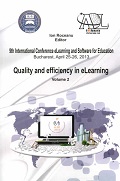"CONTINUE THE STORY" – A SIMPLE GAME, PROFOUND IMPLICATIONS FOR KNOWLEDGE MANAGEMENT
"CONTINUE THE STORY" – A SIMPLE GAME, PROFOUND IMPLICATIONS FOR KNOWLEDGE MANAGEMENT
Author(s): Aharon YadinSubject(s): Education
Published by: Carol I National Defence University Publishing House
Keywords: game based learning; knowledge management; collaborative learning
Summary/Abstract: In the modern information society, knowledge sharing and management contributes to the organizations' flexibility and its ability to respond to the market changing requirements. Due to the increased complexity of modern applications, Knowledge Management (KM) has become one of the critical success factors of software development projects. This paper describes a course structure that was designed to increase the students understanding about the importance of knowledge sharing and management. The Software Engineering (SE) course which is intended to familiarize the students with all aspects of the Software Development Life Cycle (SLDC) was taught twice by the same lecturer and used team based assignments that followed the SDLC. In the first version each team was responsible for its own project and all the project's assignments were performed by the same team. However, due to the increased understanding, in recent years, about the importance of soft skills to the future graduates' vocation, the course was changed to address the issue of KM as well. In the second version, the course used "rolling" assignments like the "Continue the Story" game. Each project was divided among three teams and each team had to continue and enhance the assignment that was previously prepared by another team. Utilizing this mechanism, knowledge sharing plays an important role and each team is both influenced by other teams and influences other teams. This interconnected network of dependencies enhanced the students understanding about the importance of sharing information and knowledge, as was demonstrated by the assignments' grades (on average) that in spite the additional work needed, were very similar to the grades of a first version of the course.
Journal: Conference proceedings of »eLearning and Software for Education« (eLSE)
- Issue Year: 9/2013
- Issue No: 02
- Page Range: 99-104
- Page Count: 6
- Language: Dutch, Middle (ca. 1050-1350)

